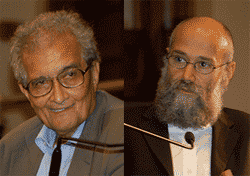Two Nobel Prize-winning economists—Harvard Professor Amartya Sen and Michael Spence—joined development expert Clotilde Fonseca, and HLS Professor Yochai Benkler ’94, co-director of the HLS Berkman Center for Internet & Society, for a discussion of the role of information and communication technologies in human development, growth and poverty reduction. The panel, entitled “Communication and Human Development: The Freedom Connection?” was organized by the Berkman Center and sponsored by Canada’s International Development Research Centre. (Watch a Webcast.)
Drawing a crowd that filled the Ames Courtroom in Austin Hall on the evening of Sept. 23, the event was the culmination of a day-long forum. Among topics discussed was the promise and limits of technologies such as cellphones—whose use in the developing world has grown dramatically in recent years—in a wide range of applications ranging from economic development to education.
Spence, chairman of the Commission on Growth and Development—an independent committee looking into growth in developing countries—said that mobile phones have enhanced economic opportunities in the developing world by giving many more people access to what they need to become investors, savers and entrepreneurs. “The cellphone provides the delivery of services,” he said, “such as safe saving channels and access to credit, at dramatically reduced costs.” But Spence and other panelists posited that the future of mobile phones in education is much more uncertain. “I don’t think the cellphone is irrelevant,” he said, “but I wouldn’t want to bet my family’s life savings that it will be the principal instrument.”
Benkler, a leading expert on the Internet and the emergence of a networked economy, was asked by the panel’s moderator, Michael Best, whether there’s “something about the architecture of the mobile phone that biases it for centralization of control. Or does the mobile network support open access to knowledge for people decentralized across the globe?”
“Everything is relative,” replied Benkler, In contrast to a centralizing system, the mobile phone is an enormously creative device, he said, citing the example of fishermen calling to shore to find out where to sell their fish, or the videos of violence shot from cellphones after recent elections in Iran.
But he also cited the limitations of the mobile phone compared to “what we see developing in countries where the population is wealthy enough to get much more powerful devices running on non-proprietary networks. … That’s the direction that we should be going, because that is the direction that actually distributes the ability to learn and to innovate.”
[Photo left: From left, Panelists Michael Best, Amartya Sen, Michael Spence and Clotilde Fonseca]
Panelists replied to questions from the audience and also tapped into online comments from around the world. To view the comments, read papers discussed during the forum—including Yochai Benkler’s “Capital, Power, and the Next Step in Decentralization”— see Global Voices special coverage.
